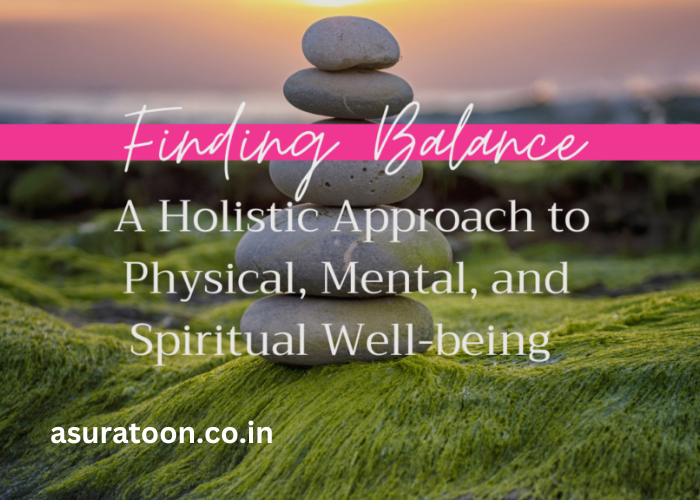Holistic health is a comprehensive approach to well-being that considers the physical, mental, emotional, and spiritual aspects of life. It goes beyond addressing symptoms and focuses on creating balance and harmony in all areas of life. This article explores the core principles, benefits, and practical applications of holistic health for achieving a balanced and fulfilling life.
Introduction: What Is Holistic Health?
Holistic health is rooted in the belief that all aspects of a person’s well-being are interconnected. Unlike conventional approaches that often focus solely on treating specific ailments, holistic health aims to identify and address the root causes of imbalances. By integrating various natural and modern practices, it fosters harmony between mind, body, and spirit.
1. The Principles of Holistic Health
Holistic health is guided by foundational principles that promote balance and well-being.
Core Principles:
- Treating the individual as a whole, not just their symptoms.
- Encouraging self-care and preventive measures.
- Acknowledging the body’s natural ability to heal.
2. Physical Wellness in Holistic Health
Physical health forms the foundation of overall well-being.
Strategies:
- Balanced nutrition focusing on whole, unprocessed foods.
- Regular physical activity tailored to individual needs.
- Adequate sleep to restore and rejuvenate the body.
3. Mental and Emotional Health
Mental and emotional wellness are critical components of holistic health.
Tips for Balance:
- Practice mindfulness or meditation to reduce stress.
- Engage in creative outlets like art or journaling.
- Build strong relationships for emotional support.
4. The Role of Spirituality
Spiritual health nurtures a sense of purpose and connection to the larger universe.
Practices:
- Meditation and prayer for inner peace.
- Connecting with nature to foster mindfulness.
- Exploring personal values and life goals.
5. The Connection Between Mind and Body
The mind-body connection plays a significant role in holistic health.
Examples:
- How stress impacts physical health.
- Using relaxation techniques to lower blood pressure.
- Benefits of yoga and tai chi in enhancing body awareness.
6. Holistic Nutrition
Food is medicine, and nutrition is a key pillar of holistic health.
Recommendations:
- Prioritize whole, organic foods over processed ones.
- Incorporate superfoods like turmeric and chia seeds.
- Hydrate adequately to support cellular functions.
7. Integrative Medicine and Therapies
Holistic health embraces integrative approaches combining conventional and alternative therapies.
Common Integrative Practices:
- Acupuncture for pain relief and stress management.
- Chiropractic care for musculoskeletal alignment.
- Herbal medicine for natural healing.
8. Stress Management for Balance
Chronic stress disrupts holistic well-being, making stress management essential.
Techniques:
- Breathing exercises like diaphragmatic breathing.
- Regular breaks to prevent burnout.
- Time management to prioritize what truly matters.
9. Importance of Social Connections
Holistic health emphasizes the importance of nurturing relationships.
Benefits:
- Reduces feelings of loneliness and depression.
- Provides emotional support during challenging times.
- Fosters a sense of community and belonging.
10. Environmental Wellness
The environment we live in significantly impacts our health.
Steps to Enhance Environmental Wellness:
- Reduce exposure to toxins in household products.
- Spend time in nature to improve mental health.
- Practice sustainable habits to protect the planet.
11. Personalized Approaches to Health
Holistic health recognizes that each person is unique, requiring tailored solutions.
Key Factors:
- Individual health history and genetics.
- Personal preferences and lifestyle.
- Cultural and spiritual beliefs.
12. Incorporating Movement into Daily Life
Physical activity is a cornerstone of holistic health.
Suggestions:
- Choose activities that you enjoy, such as dancing or hiking.
- Incorporate stretching routines to enhance flexibility.
- Engage in low-impact exercises for joint health.
13. Self-Care as a Holistic Practice
Self-care is an essential aspect of maintaining holistic health.
Practices:
- Prioritize regular “me-time” for relaxation.
- Invest in hobbies that bring joy and fulfillment.
- Maintain a healthy work-life balance.
14. Challenges and Overcoming Barriers
Implementing holistic health practices can be challenging, but solutions exist.
Common Challenges:
- Time constraints and busy schedules.
- Limited access to holistic practitioners.
- Resistance to change in daily habits.
Solutions:
- Start small and build gradually.
- Seek guidance from holistic health professionals.
- Create a supportive environment to stay consistent.
Conclusion: Embracing a Holistic Lifestyle
Holistic health offers a pathway to achieving balance, harmony, and lasting well-being. By addressing the interconnected aspects of physical, mental, emotional, and spiritual health, it empowers individuals to lead healthier and more fulfilling lives. Start by adopting small changes today, and embrace the journey toward a balanced and holistic lifestyle.

